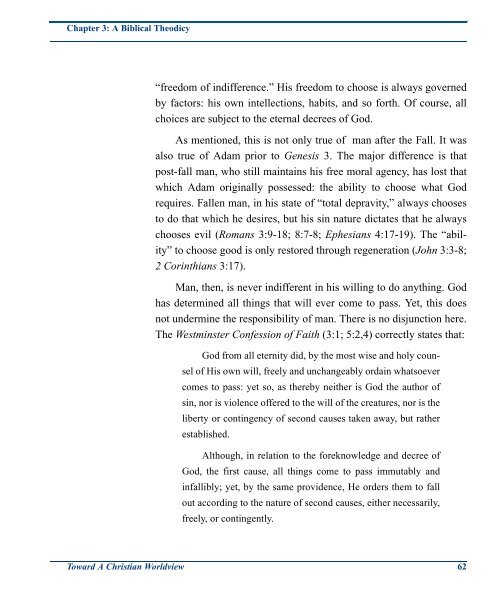Toward A Christian Worldview - Faith Presbyterian Church Reformed
Toward A Christian Worldview - Faith Presbyterian Church Reformed
Toward A Christian Worldview - Faith Presbyterian Church Reformed
You also want an ePaper? Increase the reach of your titles
YUMPU automatically turns print PDFs into web optimized ePapers that Google loves.
Chapter 3: A Biblical Theodicy<br />
“freedom of indifference.” His freedom to choose is always governed<br />
by factors: his own intellections, habits, and so forth. Of course, all<br />
choices are subject to the eternal decrees of God.<br />
As mentioned, this is not only true of man after the Fall. It was<br />
also true of Adam prior to Genesis 3. The major difference is that<br />
post-fall man, who still maintains his free moral agency, has lost that<br />
which Adam originally possessed: the ability to choose what God<br />
requires. Fallen man, in his state of “total depravity,” always chooses<br />
to do that which he desires, but his sin nature dictates that he always<br />
chooses evil (Romans 3:9-18; 8:7-8; Ephesians 4:17-19). The “ability”<br />
to choose good is only restored through regeneration (John 3:3-8;<br />
2 Corinthians 3:17).<br />
Man, then, is never indifferent in his willing to do anything. God<br />
has determined all things that will ever come to pass. Yet, this does<br />
not undermine the responsibility of man. There is no disjunction here.<br />
The Westminster Confession of <strong>Faith</strong> (3:1; 5:2,4) correctly states that:<br />
God from all eternity did, by the most wise and holy counsel<br />
of His own will, freely and unchangeably ordain whatsoever<br />
comes to pass: yet so, as thereby neither is God the author of<br />
sin, nor is violence offered to the will of the creatures, nor is the<br />
liberty or contingency of second causes taken away, but rather<br />
established.<br />
Although, in relation to the foreknowledge and decree of<br />
God, the first cause, all things come to pass immutably and<br />
infallibly; yet, by the same providence, He orders them to fall<br />
out according to the nature of second causes, either necessarily,<br />
freely, or contingently.<br />
<strong>Toward</strong> A <strong>Christian</strong> <strong>Worldview</strong> 62


